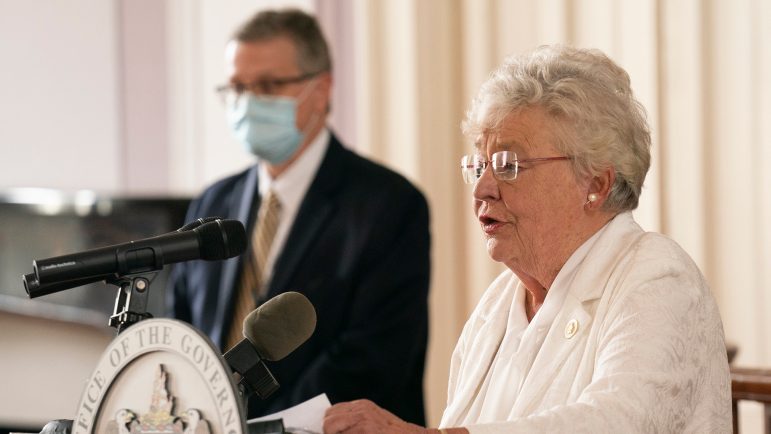Alabama Gov. Kay Ivey extended a statewide face mask order Thursday, but announced plans to lift it next month. The new order ends April 9. She said this will give businesses and other organizations time to implement policies and make adjustments of their own.
The mask order has been in place since July.
“There’s no question that wearing masks has been one of our greatest tools in combating the spread of the virus,” Ivey said. “Even when we lift the mask order, I will continue to wear my mask while I’m around others and strongly urge my fellow citizens to use common sense and do the same thing. But at that time it will become a matter of personal responsibility and not government mandate.”
The amended health order relaxed other COVID restrictions. Restaurants are no longer limited to eight diners at a table, although tables must still be socially distanced or separated by barriers.
In hospitals, patients are now allowed two caregivers at a time. Similarly, residents of long-term care facilities can have two visitors at a time.
Senior centers can host programs outside as long as there are no meals. The order also set out requirements for overnight youth camps. Despite the loosening of some rules, the order maintains social distancing and sanitation requirements for an array of businesses, organizations and locations.
Public health leaders have been urging Ivey to extend the mask requirement. They argued Alabama risks backsliding on progress made during the pandemic and that more time is needed to vaccinate more people.
New cases have been dropping in recent weeks, and hospitalizations statewide are down to a level not seen since June. But health experts are concerned about the spread of more transmissible variants.
Dr. Don Williamson, president and CEO of the Alabama Hospital Association, said he supports Ivey’s extension of the mask mandate. But he said the state must vaccinate as many people as possible and increase the state’s herd immunity level before the mask mandate expires next month.
“So that once the mask mandate comes off, if unfortunately people make the decision not to wear their mask, we have enough immunity in the population that we don’t see a substantial increase in cases,” Williamson said.
Alabama is moving in the right direction to curb the spread of the virus, Williamson said. At least one million Alabamians have received their first dose of the COVID-19 vaccine, according to state health officials.
But health experts say it’s unclear whether a fully vaccinated person can transmit the virus. That’s why experts say it’s important to still wear a face mask until herd immunity is reached. Williamson said it will be up to Alabamians to use common sense.
“The expectation is, even if the government doesn’t mandate it that people should continue to wear their mask, even after April 9th,” he said.
Gov. Ivey, a Republican, has faced pressure from members of her own party who have urged her to drop the face mask requirement. Lt. Gov. Will Ainsworth said in a statement the order infringes on individual rights and is a “Big Brother-style government mandate.” He said ending the order would send a message the state is “fully open for business.” Republican governors in Texas and Mississippi ended their mask orders this week.
I urge Gov. Kay Ivey to immediately lift the statewide mask mandate and allow citizens and local officials the liberty to make the decisions that best fit their circumstances.
— Will Ainsworth (@willainsworthAL) March 3, 2021
See my full statement: pic.twitter.com/OYDN7DrGau
Suzanne Humphries Evans, co-owner of Birmingham restaurant Automatic Seafood, said she appreciates Ivey’s extension of the mask mandate, but she has no plans to make any changes. The restaurant will continue to limit indoor seating and expand outdoor dining as the weather warms.
“[We are] not yet comfortable exposing our staff any further until all have had a chance to complete their vaccine doses,” Evans said.
Alabama administered its one-millionth coronavirus vaccine shot this week. About 7% of Alabamians have received two doses of a COVID vaccine, with 13% receiving their first.
Editor’s Note: This story was updated at 3:30 p.m.
Janae Pierre, Miranda Fulmore and Mary Scott Hodgin contributed reporting.

